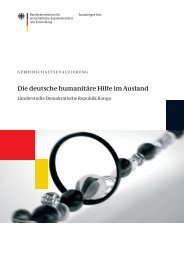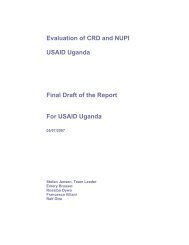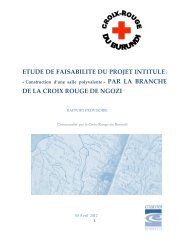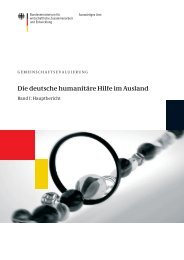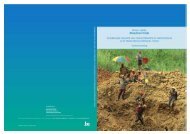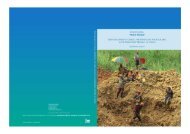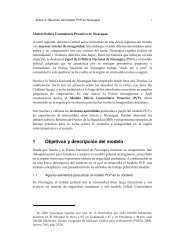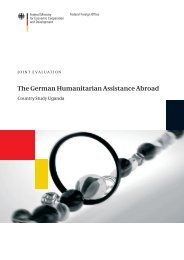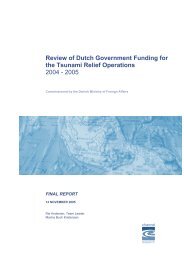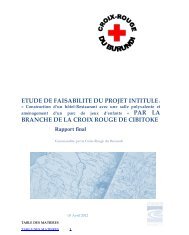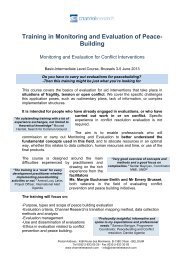A ripple in development? - Channel Research
A ripple in development? - Channel Research
A ripple in development? - Channel Research
You also want an ePaper? Increase the reach of your titles
YUMPU automatically turns print PDFs into web optimized ePapers that Google loves.
In Sri Lanka despite strong mobilisation by sub-national public<br />
governance <strong>in</strong>stitutions <strong>in</strong> the aftermath of the tsunami, few additional<br />
resources were allocated to them for tsunami work and their role was<br />
primarily to facilitate the work of aid agencies.<br />
In Indonesia, the BRR, endowed with m<strong>in</strong>isterial power, established<br />
its base <strong>in</strong> Banda Aceh and accelerated decentralisation. Decentralisation<br />
has clearly progressed <strong>in</strong> Indonesia s<strong>in</strong>ce the time of the tsunami,<br />
although serious issues of local capacity rema<strong>in</strong>. As consistent<br />
with the wishes of the Government of Indonesia, donor fund<strong>in</strong>g is<br />
<strong>in</strong>creas<strong>in</strong>gly via on-budget support <strong>in</strong>stead of be<strong>in</strong>g off-budget, lead<strong>in</strong>g<br />
to better livelihood prevention strategies and larger national <strong>development</strong><br />
strategies which are consistent with meet<strong>in</strong>g the pr<strong>in</strong>ciples of the<br />
Paris Declaration and re<strong>in</strong>forced at the Accra High Level Forum on Aid<br />
Effectiveness.<br />
The evolution of decentralisation laws <strong>in</strong> the country cont<strong>in</strong>ues, as<br />
can be seen <strong>in</strong> related public expenditure laws such as Law No. 25/2004<br />
on National Development Plann<strong>in</strong>g and Regulation No. 21/2004 on<br />
L<strong>in</strong>e M<strong>in</strong>istry and Agency Budget Work Plan.<br />
This was well matched by the creation of the MDF. Without exception,<br />
all stakeholders <strong>in</strong>terviewed by the evaluation (<strong>in</strong>clud<strong>in</strong>g government)<br />
expressed the op<strong>in</strong>ion that the role of the MDF as a policy forum<br />
had an <strong>in</strong>fluence far wider than just fund<strong>in</strong>g projects. To a large extent<br />
it helped set the agenda for the BRR, particularly <strong>in</strong> terms of process<br />
(monitor<strong>in</strong>g, procurement, etc) and the sequenc<strong>in</strong>g of priorities (hous<strong>in</strong>g,<br />
<strong>in</strong>frastructure) 26 . The MDF is (<strong>in</strong> practice) a consensual body, not a<br />
vot<strong>in</strong>g body, and there is a degree to which this is perceived to lead to<br />
lowest common denom<strong>in</strong>ator approaches – arguably, this happened <strong>in</strong><br />
2005 when construction projects with output <strong>in</strong>dicators (numbers of<br />
newly built houses, for <strong>in</strong>stance) outstripped the more medium term<br />
(and less visible) livelihoods projects 27 .<br />
But this was not a problem <strong>in</strong>herent to the MDF itself, as it simply<br />
reflected the k<strong>in</strong>d of projects be<strong>in</strong>g submitted by partner agencies. By<br />
2007, as policy-driven consensus had <strong>in</strong>creased, the MDF was, for<br />
<strong>in</strong>stance, tak<strong>in</strong>g a lead <strong>in</strong> encourag<strong>in</strong>g capacity build<strong>in</strong>g and tra<strong>in</strong><strong>in</strong>g<br />
projects (and components with<strong>in</strong> projects) for local government.<br />
Separate EC 28 and DFID reviews of the MDF concluded with a<br />
largely positive appraisal, <strong>in</strong> spite of serious delays <strong>in</strong> fulfill<strong>in</strong>g objectives.<br />
The MDF performed considerably better <strong>in</strong> the second year, and<br />
lessons from the above evaluations (particularly on start-up, more rapid<br />
release of funds, and how to overcome bureaucratic bottlenecks) have<br />
clearly translated <strong>in</strong>to more efficient decentralisation.<br />
26<br />
DFID Country Programmeme Evaluation for Indonesia, ITAD, Chris Barnett et al.<br />
27<br />
TEC Synthesis Report, 2005<br />
28<br />
“Mid-Term Evaluation of the Multi-Donor Fund for Aceh and Nias”, Particip and <strong>Channel</strong> <strong>Research</strong><br />
for the EC, 2009.<br />
43



